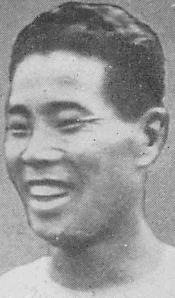Shizo Kanakuri

Shizo Kanakuri (金栗 四三, Kanaguri Shisō or Kanakuri Shizō, 20 August 1891 – 13 November 1983[1]) was a Japanese marathon runner and one of the early leaders of track and field athletics in Japan. He has been celebrated as "Father of marathon" in Japan.
Although the length of the course was probably only 40km, Kanakuri was reported to have set a marathon world record of 2:32:45 in a November 1911 domestic qualification race for the 1912 Summer Olympics.[2][nb 1]
He is best known for disappearing during the marathon race in the 1912 Summer Olympics. He lost consciousness during the race due to the heat and was cared for by a farming family. He returned to Japan without notifying race officials. Swedish authorities considered him missing for 50 years before discovering that he was living in Japan and had competed in intervening Olympic marathons. In 1966 he was contacted by Swedish Television and offered to complete his run. He accepted and completed the Marathon in 54 years, 8 months, 6 days, 8 hours, 32 minutes and 20.379 seconds.
He also competed in the 1920 Summer Olympics, where he finished the marathon race in 2'48:45.4 hours and placed 16th.
At the 1924 Summer Olympics he again failed to finish the marathon.
Notes
- ^ Road running historian Andy Milroy writing for the Association of Road Racing Statisticians has indicated that "25 miles was the distance of the first Japanese marathon held in 1911". Predating Kanakuri's performance, Milroy also indicated that a "professional world record" at the 25 mile distance of 2:32:42 was set by British runner Len Hurst on August 27, 1903.[3]
References
See also
